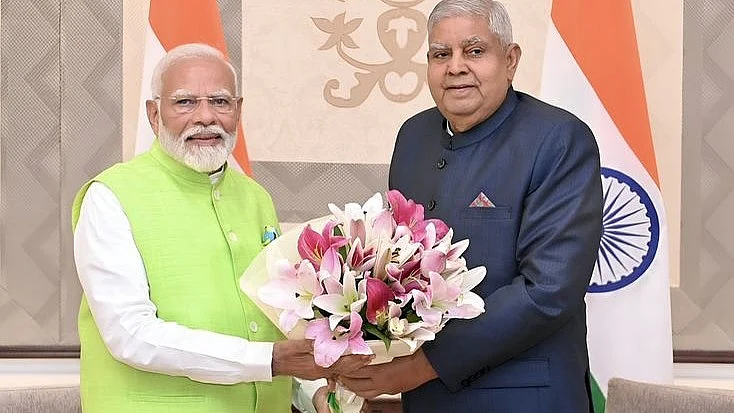Dhankhar breaks four-month silence, signals he never really left the fold
Former VP resurfaces at launch of an RSS-linked book written by senior Sangh functionary Manmohan Vaidya

Jagdeep Dhankhar’s sudden mid-term resignation as vice-president in July left the political class puzzled, not least because the announcement came hours before the Monsoon Session of Parliament.
Four months later, his first public appearance has added intrigue rather than clarity. If anyone expected Dhankhar to explain why he walked away from the country’s second-highest constitutional office, he chose instead to remind them where his ideological sympathies continue to lie.
On Friday, 21 November, Dhankhar resurfaced at the launch of an RSS-linked book — Hum Aur Yeh Vishwa — written by senior Sangh functionary Manmohan Vaidya. In a hall filled with RSS leaders, spiritual heads and influential media figures, the former vice-president delivered a speech that left little doubt about his continued alignment with the ruling party’s ideological framework.
The symbolism of the venue was unmistakable. Dhankhar could have chosen a neutral think tank, an academic platform, or even a simple press interaction for his re-emergence. Instead, he reappeared in the heart of the Sangh’s intellectual ecosystem, praising the organisation’s philosophy and framing India’s future in terms that closely echo the BJP-RSS worldview. For a man who resigned citing health reasons and then disappeared from public life for months, the political messaging could not have been clearer.
In his remarks, Dhankhar spoke at length about civilisational confidence, cultural rootedness and the need for a nation to draw strength from its heritage. He endorsed the book’s articulation of India as a country shaped by thousands of years of accumulated wisdom, capable of guiding a world facing “unprecedented” geopolitical and environmental upheavals.
He also highlighted themes central to the RSS’s current campaigns — social harmony, family upliftment, environmental protection, self-reliance and civic duty.
More striking was his decision to shift from Hindi to English midway through his address — a move he said was necessary to ensure that “those who do not want to understand” his intentions would be forced to confront them in the language they operate in. The line was widely read as a swipe at his critics, especially those who questioned his conduct in office and the circumstances of his resignation.
Dhankhar also defended the Citizenship (Amendment) Act, dismissing the opposition to it as “misconceived”, and invoked Pranab Mukherjee’s controversial 2018 visit to the RSS headquarters as an example of statesmanship unfazed by political noise. These references further underscored his comfort within the ideological matrix that the ruling party considers its core.
Yet despite the political clarity of his messaging, one major question remained unanswered: why did he resign? His exit, accepted with unusual speed and minimal explanation, has fuelled speculation ranging from internal disagreements to health concerns to political repositioning. Dhankhar, however, chose not to address any of it. He left the event without taking questions, keeping the uncertainty intact.
What his speech did confirm is that Dhankhar is not distancing himself from the power structure he once served. His silence may have lasted four months, but his ideological commitments appear unchanged. Whether his reappearance marks the beginning of a new political role or simply a reaffirmation of loyalty remains to be seen — but his return has made one thing clear: Jagdeep Dhankhar may have left office, but he has not left the fold.
With PTI inputs
Follow us on: Facebook, Twitter, Google News, Instagram
Join our official telegram channel (@nationalherald) and stay updated with the latest headlines
